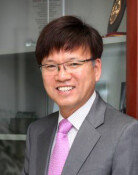Pres. Park must build amicable relations with China for peace on Korean Peninsula
Pres. Park must build amicable relations with China for peace on Korean Peninsula
Posted September. 09, 2015 16:29,
South Korean President Park Geun-hye made the decision on Sep. 3 to attend the military parade which mark the 70th anniversary of end of World War II in China. It is glad to see that President Parks decision came after the military tension between the North and the South, which had been sparked by North Koreas landmine blast in the DMZ and firing of an anti-craft gun, has settled down.
Relations between South Korea and China are complicated and sophisticated in many aspects, commensurating with its diplomatic title of Strategic Cooperation Partner. South Korea is a traditional ally of the U.S., the rival of China, and China is in an alliance with North Korea, South Koreas main adversary. North Korea-China relations have been frozen since Kim Jong Un regime took over four years ago, and now the relations hit the lowest point to an extent that North Korean leader Kim Jong Un would not attend the military parade. However, China has never given up on North Korea because of its diplomatic strategies in Northeast Asia. Chinas grip on the North Korean regime has been weakened compared to the past but China still holds the life-or-death authority over North Korea.
On the contrary, South Korea-China relations have been close in spite of ideological differences since Chinese President Xi Jinping took office. Amicable relations can be evidenced by many facts: President Xi visited South Korea first before visiting North Korea, China and South Korea held summits frequently and the two nations signed the free trade agreement. Since establishment of the diplomatic ties, South Korea-China trade volume exceeded USD 235.4 billion last year. The number of visitors between the two nations is now over 10 million. South Koreas trade with China accounts for 25% of its total trade volume, which outweighs South Koreas trade with the U.S.
China has ambitiously prepared the military parade to mark the 70th anniversary of WWII victory over Japan to boast its national strength and military might. At the celebration ceremony, leaders from 30 nations including Russian President Vladimir Putin and 59 delegates from the world including U.N. Secretary-General Ban Ki-moon are supposed to attend. Japan decided not to send the government delegates. For the U.S., the ambassador in China plans to attend as a representative.
With President Parks attendance in the military parade, China aims to strengthen friendship between China and South Korea, which are both victims of Japanese imperialism and colonization. Also, it wants to put the limelight on the victory of anti-Japanese and anti-fascist war. It has an intention to weaken the South Korea-U.S.-Japan military alliance by keeping the U.S. and Japan in check, which form a joint defense system against China in Northeast Asia. It is the reason why China has exerted much efforts to receive the RSVP from President Park, the leader of a traditional ally of the U.S.
Meanwhile, South Korea has a lot to earn through President Parks participation in the military parade. China is the regional hegemonic power in Northeast Asia and the nation which can exercise the biggest influence over North Korea, the other party of unification on the Korean peninsula. Based on trust that it has built with China, South Korea may be able to serve as a constructive mediator for establishment of peace in Northeast Asia and around the world between China and the U.S. which are at odds. South Korea is in need of Chinas help for resolution of North Korean nuclear crisis, peace and stabilization of the Korean peninsula and the unification. China has played a constructive role in some part in resolution of the recent military tensions between the North and the South.
Chinese President Xi calls President Park 老朋友, which means an old friend in China. Seemingly, relations between South Korea and China are close, so much so that politicians in Washington are concerned of South Koreas tilting toward China. Even though, China has never played a practical role for North Koreas nuclear resolution and unification of the Korean peninsula. Senior presidential secretary for foreign and security affairs Ju Cheol-gi reportedly visited Beijing on Aug. 20, when North Korea fired at South Korea, to discuss agenda for South Korea-China summits.
President Park must present all proposals in the summit with President Xi on Sep. 2 and have candid discussions. President Park must request for Chinas strong pressure for complete resolution of North Korean nuclear issues, strict application of U.N. sanctions such as limitation on oil supplies to North Korea, and Chinas humanitarian treatment for North Korean defectors in accordance with the international laws. President Park must not waste the golden time. Attendance of Park to the military parade was decided through careful deliberations as South Korea is an ally of the U.S. President Xi may know South Koreas position better than anyone else.
President Park must strongly demand President Xi to exercise Chinas control over North Korea in every issues, such as North Koreas nuclear problems, citing that North Koreas small-scale provocation such as landmine installation in DMZ and firing at South Korea can evolve into an all-out war and generate a catastrophic disaster in Northeast Asia. President Xis warm smiles and amicable relations between South Korea and China must be realized into concrete actions which contribute to unification on the Korean peninsula.
YOH,YEUNG-MOO Institute for South-North Korea Strategy Studies Director







